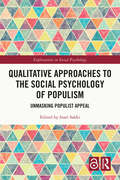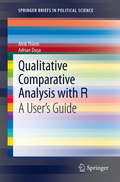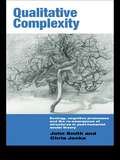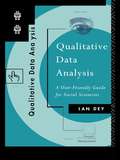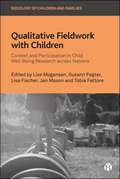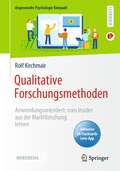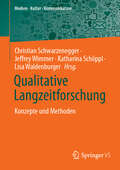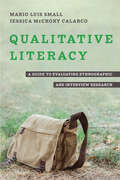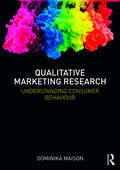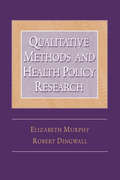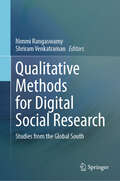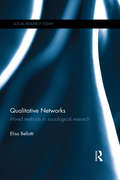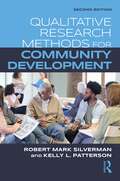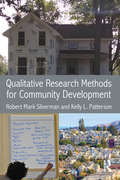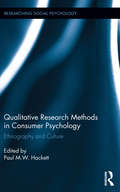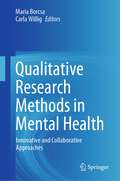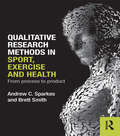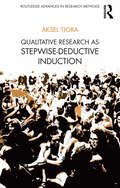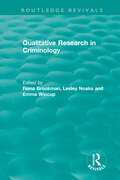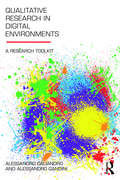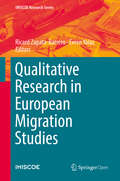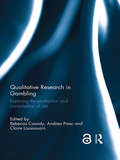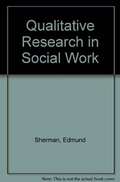- Table View
- List View
Qualitative Approaches to the Social Psychology of Populism: Unmasking Populist Appeal (Explorations in Social Psychology)
by Inari SakkiThis edited volume presents a social psychological exploration of populism and provides a unique qualitative understanding of the phenomenon’s appeal, bringing together an international mix of experts to interrogate populist attraction worldwide.Featuring contributions from Finland, Greece, and Switzerland, the book offers nuanced theoretical, methodological, and empirical approaches for understanding populism, with chapters investigating topics such as populist communication, lay discourse, social representations of the elite and the people, and the mobilisation of young people. Unmasking the persuasive appeal of populism, the book provides examples of qualitative approaches within social, cultural, and political psychology. It draws from established theoretical traditions such as social representations theory and social identity theory, as well as critical discursive approaches, to demonstrate how to study complex relational phenomena such as populism.With its novel inclusion of innovative qualitative methods for examining the social psychology of populism – providing a useful toolkit for qualitative research across various societal and political topics – this book will appeal to scholars, postgraduate students, and researchers studying social and political psychology, communication, qualitative research methods, and political behaviour more broadly.
Qualitative Comparative Analysis with R
by Adrian Dusa Alrik ThiemSocial science theory often builds on sets and their relations. Correlation-based methods of scientific enquiry, however, use linear algebra and are unsuited to analyzing set relations. The development of Qualitative Comparative Analysis (QCA) by Charles Ragin has given social scientists a formal tool for identifying set-theoretic connections based on Boolean algebra. As a result, interest in this method has markedly risen among social scientists in recent years. This book offers the first complete introduction on how to perform QCA in the R software environment for statistical computing and graphics with the QCA package. Developed as a comprehensive solution, QCA provides an unprecedented scope of functionality for analyzing crisp, multi-value and fuzzy sets. The reader is not required to have knowledge of R, but the book assumes an understanding of the fundamentals of QCA. Using examples from published work, the authors demonstrate how to make the most of QCA's wide-ranging capabilities for the reader's own purposes. Although mainly written for political scientists, this book is also of interest to scholars from other disciplines in the social sciences such as sociology, business, management, organization, anthropology, education and health.
Qualitative Complexity: Ecology, Cognitive Processes and the Re-Emergence of Structures in Post-Humanist Social Theory (International Library of Sociology #10)
by John Smith Chris JenksOffering a critique of the humanist paradigm in contemporary social theory, Qualitative Complexity is the first comprehensive sociological analysis of complexity theory. Drawing from sources in sociology, philosophy, complexity theory, 'fuzzy logic', systems theory, cognitive science and evolutionary biology, John Smith and Chris Jenks present a new series of interdisciplinary perspectives on the sociology of complex, self-organizing structures.
Qualitative Data Analysis: A User Friendly Guide for Social Scientists
by Ian DeyFirst Published in 2004. Routledge is an imprint of Taylor & Francis, an informa company.
Qualitative Fieldwork with Children: Context and Participation in Child Well-Being Research across Nations (Sociology of Children and Families)
by Lise Mogensen, Susann Fegter, Lisa Fischer, Jan Mason and Tobia FattoreDrawing on the multinational qualitative study ‘Children’s Understandings of Well-being’ (CUWB), this unique edited collection offers practical insights into conducting fieldwork across diverse geographical, social and cultural contexts, using the same basic protocol. The book explores the practical, ethical and philosophical challenges the researchers faced, and the ways in which these issues were dealt with by the different research teams. Contributors provide rare insights into the diverse institutional requirements and professional practices highlighting the way research methods are embedded in contexts that are at one and the same time both local and global. With contributions from experts in child well-being research from Argentina, Australia, Canada, Chile, Germany, Romania, South Africa, Switzerland, Turkey, the UK and the US, the book provides valuable perspectives for researchers across a wide range of settings.
Qualitative Forschungsmethoden: Anwendungsorientiert: vom Insider aus der Marktforschung lernen (Angewandte Psychologie Kompakt)
by Rolf KirchmairEndlich ein Buch über qualitative Forschungsmethoden, das Ihnen im Studium und in der Alltagspraxis einen umfassenden Überblick über qualitative Forschung bietet und qualitative Methoden durch konkrete Formulierungsbeispiele transparent macht.Dieses Lehrbuch beinhaltet alle wichtigen Verfahren wie:Qualitative InterviewsFocus GroupsKreativitätstechniken Methoden der indirekten Befragung und ihre Auswertungneueste Ansätze der qualitativen Onlineforschung, etc.Wissenschaftlich fundiert und dennoch angenehm lesbar hilft es durch den starken Praxisbezug, die Lerninhalte gut im Gedächtnis zu verankern. Durch den klaren didaktischen Aufbau mit Lernzielen, Anwendungsbeispielen, Schlüsselbegriffen, Prüfungsfragen und Zusammenfassungen sowie die eingebundenen Audioclips verhilft es im Studium zu nachhaltigem Lernerfolg. In der Alltagspraxis unterstützt es durch Formulierungsvorschläge den Einsatz qualitativer Methoden. Eine Begleitwebseite bereichert dieses Lehrbuch mit hilfreichen Zusatzmaterialien.Zusätzlich sind Fragen und Antworten zum Selbsttest und zur Prüfungsvorbereitung über die SN Flashcards Lern-App inkludiert. Der Zugangscode befindet sich im gedruckten Buch.Die ZielgruppenStudierende und Lehrende der Psychologie, Wirtschaftspsychologie und angrenzender Disziplinen, die Grundlegendes in kompakter, übersichtlicher und praxisnaher Form verstehen und anwenden wollen. Auch geeignet für Forscher und Professionals im Institut und Unternehmen.Zum AutorRolf Kirchmair ist Diplompsychologe, Institutsmarktforscher und Hochschuldozent mit jahrzehntelanger Praxiserfahrung in der qualitativen Forschung.
Qualitative Langzeitforschung: Konzepte und Methoden (Medien • Kultur • Kommunikation)
by Jeffrey Wimmer Christian Schwarzenegger Lisa Waldenburger Katharina SchöpplQualitative Langzeitforschung ist in Zeiten tiefgreifender gesellschaftlicher und medialer Wandlungsprozesse von essenzieller Bedeutung Der Sammelband adressieret zentrale methodologische und methodische Fragestellungen und zeigt auf, wie den vielfältigen Herausforderungen begegnet werden kann. Insgesamt versteht er sich als ein ‚Kaleidoskop an Lösungsansätzen und Innovationen, welches Forschenden, die qualitativ im Längsschnitt arbeiten, als diskursive Hilfestellung dienen soll.
Qualitative Literacy: A Guide to Evaluating Ethnographic and Interview Research
by Mario Luis Small Jessica McCrory CalarcoSuppose you were given two qualitative studies: one is a piece of empirically sound social science and the other, though interesting and beautifully written, is not. How would you tell the difference? Qualitative Literacy presents criteria to assess qualitative research methods such as in-depth interviewing and participant observation. Qualitative research is indispensable to the study of inequality, poverty, education, public health, immigration, the family, and criminal justice. Each of the hundreds of ethnographic and interview studies published yearly on these issues is scientifically either sound or unsound. This guide provides social scientists, researchers, students, evaluators, policy makers, and journalists with the tools needed to identify and evaluate quality in field research.
Qualitative Marketing Research: Understanding Consumer Behaviour
by Dominika MaisonThis is a perfect guide to understanding the core principles of qualitative marketing research. It presents qualitative marketing research in the broader context of marketing and managerial decisions, consumer psychology and contemporary knowledge about unconscious and automatic processes. Different types of qualitative marketing research methods are examined, from the classic focus group interview (FGI) and individual in-depth interview (IDI), to more cutting-edge methods such as ethnography or bulletin boards, which enable marketing researchers to discover and understand real consumer motivations, needs, values, and attitudes. With numerous international case studies, including PepsiCo, Unilever, Danone, Nestle, Aviva and Citibank, the book is uniquely practical in its approach. It is vital reading for advanced undergraduate and postgraduate students of marketing research, consumer behaviour and consumer psychology.
Qualitative Markt- und Konsumforschung: Einführung und Praxis-Handbuch (Konsumsoziologie und Massenkultur)
by Thomas Kühn Kay-Volker KoschelDie Autoren Thomas Kühn und Kay-Volker Koschel geben in diesem Buch eine praxisnahe Einführung in Grundgedanken und Methoden der qualitativen Markt- und Konsumforschung. Zur Veranschaulichung werden zahlreiche Praxisbeispiele gegeben und typische Fehler bei der Konzeption typischer Studien identifiziert und Lösungsmöglichkeiten angeboten.
Qualitative Methods and Health Policy Research (Social Problems And Social Issues Ser.)
by Elizabeth MurphyQualitative researchers have traditionally been cautious about claiming that their work was scientific. The "right-on" schools have exaggerated this caution into an outright rejection of science as a model for their work. Science is, for them, outmoded; "an archaic form of consciousness surviving for a while yet in a degraded form" (Tyler 1986:200). Scientists' assertions that they are in pursuit of truth simply camouflage their own lust for power. There is no essential difference between truth and propaganda.The authors acknowledge that the boundary between science and propaganda has often been breached and some distrust of scientific claims may be healthy. They also question the claim that science creates disinterested and objective knowledge of an observer-independent world without concluding that science is impossible. The skeptics' reservations about qualitative research are based on the deep-rooted assumption among natural scientists, and some social scientists, that there is a world "out there," prior to, and independent of, their observations. This world can be known objectively in the sense that all observers will, if identically placed, see it in exactly the same way. If a suitable language were available, they would also all produce identical descriptions. From these observations they can work out the laws governing the world's operations. The authors try to resolve these contrary claims by asserting that science is a procedural commitment. It consists of openness to refutation, a conscientious and systematic search for contradictory evidence, and a readiness to subject one's preconceptions to critical examination. The devotion to truth as a regulative ideal is an essential difference between science and propaganda. This work is a unique and innovative defense of scientific method.
Qualitative Methods for Digital Social Research: Studies from the Global South
by Nimmi Rangaswamy Shriram VenkatramanThis volume offers a series of practical methods to study digital behaviours considering the socio-cultural realities of the global south. It includes methodologically rigorous applied research chapters from leading international researchers offering information on gold mines and blind spots in researching the digital in the global south. It develops a tri-sectional format based on distinct areas of research, geographical variability and diversity of methods and approaches. The first section focuses on Dissecting Research Fractures – which disrupts the established research ideologies and practices, user behaviors, theoretical perspectives, and field methods in the study of digital social research . The second section on Innovating Methods proposes and extends mixed methodologies that go beyond research boundaries to produce novel possibilities for study. The final section on Re-Imagining the Field breaks new ground in exploring the social-digital where a transient research field is contextualized and stabilized through the social, infrastructural, and digital interweaving. The book offers the reader an inside view of studying marginal yet emerging users and consumers of digital technologies. The three sections together purport to draw textual, graphical, temporal, and ethnographic insights via innovative and hybrid observational tools to record, annotate and formulate everyday experiences of digital life. The volume addresses scholars interested in hybridizing methods, early career researchers, and graduates working on connecting humans and digital technologies. It also holds considerable appeal for digital marketers and strategists, offering practically applicable methods to study digital life.
Qualitative Networks: Mixed methods in sociological research (Social Research Today)
by Elisa BellottiHow do we interact with people in our everyday life? Who are the people we are connected to? What are the consequences of overlapping social circles and how people deal with the potential emerging conflicts? What are the structural and cultural mechanisms that regulate social worlds? Network science is a scientific approach to the study of network dependencies and associations which tries to answer these and many other questions. This book explores the underlying mechanisms that regulate social life as they are produced, reproduced, modified, and abandoned in the spatial and temporal patterns of interactions. The mixed methods approach, that combines formal network analysis with qualitative materials and statistical tools, shows the importance of contextualising structural mechanisms in their social and cultural environment, and allows overcoming the traditional methodological boundaries that shape the field of social sciences.
Qualitative Research Methods for Community Development
by Robert Mark Silverman Kelly L. PattersonThe second edition of Qualitative Research Methods for Community Development teaches the basic skills, tools, and methods of qualitative research with special attention to the needs of community practitioners. This book teaches students entering planning, community development, nonprofit management, social work, and similar applied fields the core skills necessary to conduct systematic research designed to empower communities and promote social change. Focusing on the basic elements of qualitative research, such as field observation, interviewing, focus groups, and content analysis, this second edition of this book provides an overview of core methods and theoretical underpinnings of successful research. It also includes two new chapters on qualitative data analysis software and techniques for conducting online qualitative interviews and focus groups. From housing, community organizing, neighborhood planning, and urban revitalization, this book gives students the skills they need to undertake their own projects and provides professionals a valuable reference for their future research. This book serves as a primary text for courses in applied qualitative research and as a reference book for professionals and community-based researchers.
Qualitative Research Methods for Community Development
by Robert Mark Silverman Kelly L. PattersonQualitative Research Methods for Community Development teaches the basic skills, tools, and methods of qualitative research with special attention to the needs of community practitioners. This book teaches students entering planning, community development, nonprofit management, social work, and similar applied fields the core skills necessary to conduct systematic research designed to empower communities and promote social change. Focusing on the basic elements of qualitative research, like field observation, interviewing, focus groups, and content analysis, Qualitative Research Methods for Community Development provides an overview of core methods and theoretical underpinnings of successful research. The book provides examples from past research used in transformative community projects across multiple disciplines. From housing, community organizing, neighborhood planning, and urban revitalization, this book gives students the skills they need to undertake their own projects, and provides professionals a valuable reference for their future research. The book serves as a primary text for courses in applied qualitative research, and as a reference book for professionals and community-based researchers. In addition to content detailing core methods used in qualitative research, it includes a chapter which provides guidance for the dissemination of qualitative results to a spectrum of audiences applying qualitative methods to action research and community empowerment.
Qualitative Research Methods for Community Development
by Robert Mark Silverman Kelly PattersonThe second edition of Qualitative Research Methods for Community Development teaches the basic skills, tools, and methods of qualitative research with special attention to the needs of community practitioners. This book teaches students entering planning, community development, nonprofit management, social work, and similar applied fields the core skills necessary to conduct systematic research designed to empower communities and promote social change.Focusing on the basic elements of qualitative research, such as field observation, interviewing, focus groups, and content analysis, this second edition of this book provides an overview of core methods and theoretical underpinnings of successful research. It also includes two new chapters on qualitative data analysis software and techniques for conducting online qualitative interviews and focus groups.From housing, community organizing, neighborhood planning, and urban revitalization, this book gives students the skills they need to undertake their own projects and provides professionals a valuable reference for their future research. This book serves as a primary text for courses in applied qualitative research and as a reference book for professionals and community-based researchers.
Qualitative Research Methods in Consumer Psychology: Ethnography and Culture
by Paul HackettWhile consumer research is founded on traditional quantitative approaches, the insight produced through qualitative research methods within consumer settings has not gone unnoticed. The culturally situated consumer, who is in intimate dialogue with their physical, virtual and social surroundings, has become integral to understanding the psychology behind consumer choices. This volume presents readers with theoretical and applied approaches to using qualitative research methods in ethnographic studies looking at consumer behavior. It brings together an international group of leading scholars in the field of consumer research, with educational and professional backgrounds in marketing, advertising, business, education, therapy and health. Researchers, teaching faculty, and students in the field of consumer and social psychology will benefit from the applied examples of qualitative and ethnographic consumer research this volume presents.
Qualitative Research Methods in Mental Health: Innovative and Collaborative Approaches
by Maria Borcsa Carla WilligThis book examines innovative approaches to the use of qualitative methods in mental health research. It describes the development and use of methods of data collection and analysis designed. These methods address contemporary and interdisciplinary research questions, such as how to access the voices of vulnerable populations, understand the relationship between experience and discourse, and identify processes and patterns that characterize institutional practices. The book offers insight into projects that reflect various cultural contexts and geographical locations as well as involve diverse research teams, ranging in their methodology from individual case studies to community-based interventions.Chapters address how research method selection needs to be tailored to specific contexts within which studies are carried out and how synthesizing diverse perspectives of different disciplines – such as psychology, sociology, linguistics, history, and art – make a research endeavor more fruitful. The book offers a clear framework in which to assess the research presented in the book as well as map future directions for qualitative methodology in mental health research.Key areas of coverage include projects that describe research with:• Individuals confronted with critical life events.• Former psychiatric patients.• Individual and couple psychotherapy clients.• Clients in a forensic setting.• Persons affected by psychosis.• Dementia patients.• People living with cancer.• Health care professionals. Qualitative Research Methods in Mental Health is a valuable resource for researchers, professors, and graduate students as well as therapists and other professionals in clinical and counseling psychology, psychotherapy, social work, and family therapy as well as all interrelated psychology and medical disciplines.
Qualitative Research Methods in Sport, Exercise and Health: From Process to Product
by Andrew C. Sparkes Brett SmithQualitative forms of inquiry are a dynamic and exciting area within contemporary research in sport, exercise and health. Students and researchers at all levels are now expected to understand qualitative approaches and be able to employ them in their work. In this comprehensive and in-depth introductory text, Andrew C. Sparkes and Brett Smith take the reader on a journey through the entire qualitative research process that begins with the conceptualization of ideas and the planning of a study, moves through the phases of data collection and analysis, and then explains how findings might be represented in various ways to different audiences. Ethical issues are also explored in detail, as well as the ways that the goodness of qualitative research might be judged by its consumers. The book is based on the view that researchers need to make principled, informed and strategic decisions about what, why, when, and how to use qualitative forms of inquiry. The nature of qualitative research is explained in terms of both its core assumptions and what practitioners actually do in the field when they collect data and subject it to analysis. Each chapter is vividly illustrated with cases and examples from published research, to demonstrate different qualitative approaches in action and their relative strengths and weaknesses. The book also extends the boundaries of qualitative research by exploring innovative contemporary methodologies and novel ways to report research findings. Qualitative Research Methods in Sport, Exercise and Health is essential reading for any student, researcher or professional who wishes to understand this form of inquiry and to engage in a research project within a sport, exercise or health context.
Qualitative Research as Stepwise-Deductive Induction (Routledge Advances in Research Methods)
by Aksel TjoraThis book provides thorough guidance on various forms of data generation and analysis, presenting a model for the research process in which detailed data analysis and generalization through the development of concepts are central. Based on an inductive principle, which begins with raw data and moves towards concepts or theories through incremental deductive feedback loops, the ‘stepwise-deductive induction’ approach advanced by the author focuses on the analysis phase in research. Concentrating on creativity, structuring of analytical work, and collaborative development of generic knowledge, it seeks to enable researchers to extend their insight of a subject area without having personally to study all the data generated throughout a project. A constructive alternative to Grounded Theory, the approach advanced here is centred on qualitative research that aims at developing concepts, models, or theories on basis of a gradual paradigm to reduce complexity. As such, it will appeal to scholars and students across the social sciences with interests in methods and the analysis of qualitative data of various kinds.
Qualitative Research in Criminology (Routledge Revivals)
by Emma Wincup Fiona Brookman Lesley NoaksPublished in 1999, this text brings together detailed reflexive accounts of authors’ experiences of conducting research on a variety of criminological topics. The broad aim of the book is to critically review how qualitative methods can be effectively deployed in the area of criminology. The conclusions reached in the text are diverse, reflecting the range of qualitative methods considered and the particular criminological topics to which they are applied. A common theme throughout is that whilst qualitative research can help to provide valid and meaningful information on criminological issues, researchers need to carefully reflect upon both the methodological and ethical dimensions of their work. The book will appeal to those who wish to understand the experience of conducting qualitative research on aspects of crime and criminal justice. This will include undergraduate and postgraduate students undertaking research for the first time, as well as experienced researchers and teachers. This book was originally published as part of the Cardiff Papers in Qualitative Research series edited by Paul Atkinson, Sara Delamont and Amanda Coffey. The series publishes original sociological research that reflects the tradition of qualitative and ethnographic inquiry developed at Cardiff. The series includes monographs reporting on empirical research, edited collections focussing on particular themes, and texts discussing methodological developments and issues.
Qualitative Research in Digital Environments: A Research Toolkit
by Alessandro Gandini Alessandro CaliandroThis book offers a toolkit of methods and technologies to undertake qualitative research on digital spaces. Unlike commonly used traditional methodological strategies, which are ‘retrofitted’ to digital spaces, Qualitative Research in Digital Environments offers researchers a set of ‘digitally native’ tools that are designed for online social environments. Thanks to a broad range of cases including Louis Vuitton, YouTube and the concept of ‘hipsterism’, this text illustrates the practical applications of techniques and tools over the most popular social media environments. This book will be a valuable guide to qualitative research for marketing students, researchers and practitioners, as well as a central reference point for tutors in the growing field of Digital Sociology.
Qualitative Research in European Migration Studies (IMISCOE Research Series)
by Ricard Zapata-Barrero Evren YalazThis open access book covers the main issues, challenges and techniques concerning the application of qualitative methodologies to the study of migration. It discusses theoretical, epistemological and empirical questions that must be considered before, during, and after undertaking qualitative research in migration studies. It also covers recent innovative developments and addresses the key issues and major challenges that qualitative migration research may face at different stages i.e. crafting the research questions, defining approaches, developing concepts and theoretical frameworks, mapping categories, selecting cases, dealing with concerns of self-reflection, collecting and processing empirical evidence through various techniques, including visual data, dealing with ethical issues, and developing policy-research dialogues. Each chapter discusses relative strengths and limitations of qualitative research. The chapters also identify the main drivers for qualitative research development in migration studies. It is a unique volume as it brings together a multidisciplinary perspective as well as illustrations of different issues derived from the research experience of the recognized authors. One additional value of this book is its geographic focus on Europe. It seeks to explore theoretical and methodological issues that are raised by distinctive features of the European context. This volume will be a useful reference source for scholars and professionals in migration studies and in social sciences as well. The publication is also addressed to graduate and post-graduate students and, more generally, to those who embark on the task of doing qualitative research for the first time in the field of migration.
Qualitative Research in Gambling: Exploring the production and consumption of risk
by Rebecca Cassidy Andrea Pisac Claire LoussouarnThe Open Access version of this book, available at http://www.tandfebooks.com, has been made available under a Creative Commons Attribution-Non Commercial-No Derivatives 3.0 license. Gambling is both a multi-billion-dollar international industry and a ubiquitous social and cultural phenomenon. It is also undergoing significant change, with new products and technologies, regulatory models, changing public attitudes and the sheer scale of the gambling enterprise necessitating innovative and mixed methodologies that are flexible, responsive and ‘agile’. This book seeks to demonstrate that researchers should look beyond the existing disciplinary territory and the dominant paradigm of ‘problem gambling’ in order to follow those changes across territorial, political, technical, regulatory and conceptual boundaries. The book draws on cutting-edge qualitative work in disciplines including geography, organisational studies, sociology, East Asian studies and anthropology to explore the production and consumption of risk, risky places, risk technologies, the gambling industry and connections between gambling and other kinds of speculation such as financial derivatives. In doing so it addresses some of the most important issues in contemporary social science, including: the challenges of studying deterritorialised social phenomena; globalising technologies and local markets; regulation as it operates across local, regional and international scales; and the rise of games, virtual worlds and social media.
Qualitative Research in Social Work
by William J. Reid Edmund ShermanIn this volume, progressive experts survey recent trends in qualitative study, which relies on small sample groups and interview data to better represent the context and complexity of social work practice. Chapters address different approaches to qualitative inquiry, applications to essential areas of research and practice, integration of qualitative and quantitative methods, and epistemological issues. <p><p> This second edition brings even greater depth and relevance to social work qualitative research, including new material that tackles traditional research concerns, such as data quality, ethics, and epistemological stances, and updated techniques in data collection and analysis. To increase the usefulness for students and researchers, the editors have reorganized the text to present basic principles first and then their applications, and they have increased their focus on ethics, values, and theory. New and revised illustrative studies highlight more than ever the connection between effective research and improved social functioning among individuals and groups. The collection continues to feature scholars and practitioners who have shaped the social work research practice canon for more than twenty years, while also adding the innovative work of up-and-coming talent.
